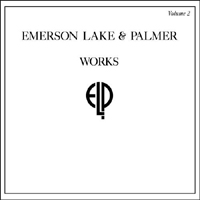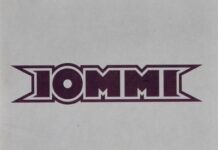I realize there might very well be a few Emerson, Lake and Palmer albums one would consider better off forgotten. When I asked Greg Lake about 1978’s Love Beach, he simply said, “I hate that bloody album!” These are the ones they don’t quite qualify as “classics,” yet over time they appreciate in value, becoming lost gems from a classic band. So, let’s examine the album that preceded the ill-fated Love Beach — Works Volume 2.
Coming off the double-disc assault of 1977’s Works Volume 1 and the massive tour the band executed with an orchestra (which broke them financially), Works Volume 2, released in the same year, is a 12-song, slightly jazzy, more or less collection of left-overs and what-nots. It lifts off with the jumpy “Tiger In the Spotlight,” as commercial a tune as you’re gonna find on this album. Written by Emerson, Lake, Palmer and frequent ELP lyricist Peter Sinfield, the song did, in fact, enjoy some radio airplay. It’s a tight little tune with a slightly naughty lyric.
Next up is the jazzy Carl Palmer-led instrumental. “When The Apple Blossoms Bloom In The Windmills Of Your Mind (I’ll Be Your Valentine),” the longest title in the ELP canon and a breezy work-out from the band. It’s interesting to note that “Tiger,” “Apple” and a third song with the unlikely title of “Brain Salad Surgery” were all recorded during the Brain Salad Surgery sessions in 1973. They just didn’t make the cut for that record.
“Bullfrog” is another instrumental from a band that certainly knows something about instrumentals. This is probably the weakest song on the record. The aforementioned “Brain Salad Surgery” (not to be confused with the album of the same name) features some cool fat bass playing from Lake. I especially like the intro where he lays off notes, slides down, etc. Meanwhile, Palmer works out his snare and Emerson picks on a litany of keyboards. Vocally, Lake employs the old “Benny The Bouncer” snarl, singing a silly spacey lyric with true punch.
“Barrelhouse Shake-Down” is a piano workout for Emerson, who up until this point, isn’t really as featured as much as the others. “Watching Over You” is a pretty acoustic number in the style for which Lake is so well known. Kickin’ horns, drums and vocals make up the wonderful “So Far To Fall,” the first song of side two if you have a vinyl copy. This is another tune with a slightly naughty lyric: “She did a thing to my thing likes it’s never been done before…”” What the hell — it’s a breath of fresh air from a trio perceived as being overly dramatic.
“Maple Leaf Rag” is Emerson’s rendition of the Scott Joplin classic, but like “Bullfrog,” it’s a competently played but otherwise weak showing. We are into a stripped-down version of Greg Lake’s “I Believe In Father Christmas” next. By 1977, the orchestral version of this tune had already been released as a solo Greg Lake piece, becoming a standard to this day for the season. The Works version is notable for a more group feel, with Emerson’s piano work, especially his nicking of a classical snippet at the end, a highlight. “Close But Not Touching” is a Palmer tour-de-force, with some nice electric guitar touches from Lake and a specific hum-able melody line and rolling horns.
Horns also appear on “Honky Tonk Train Blues,” a Meade “Lux” Lewis smoker showcasing Emerson ala “Barrelhouse Shake-Down.” The spiky horn snap and roll not only complement Emo’s powerful playing (what a great left hand he has!), but amp up his rep for tight jazz orchestration. The old-folks drinking tune from Campbell and Connelly “Show Me The Way To Go Home” ends it all with a string section and Emerson’s piano aligning itself with Lake’s note-perfect voice.
Surely this was not the usual release we had come to expect from ELP, nor would ever see again really. Far from a concept album, Works Volume 2, recently bundled with Works Volume 1 as Works 1 & 2, is pretty much a piecemeal affair from the final years of one of prog’s most celebrated trios. Still, I believe this record is a gem, albeit maybe of a very specific type, but a release certain not to be forgotten.
~ Ralph Greco, Jr.




















